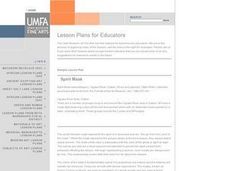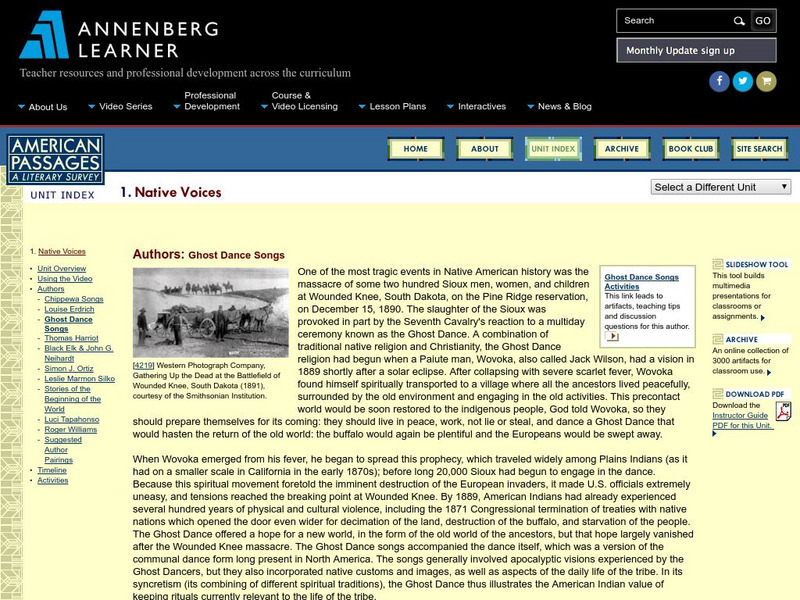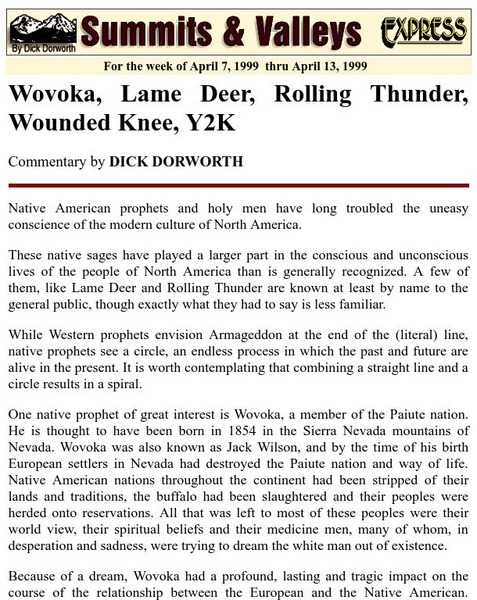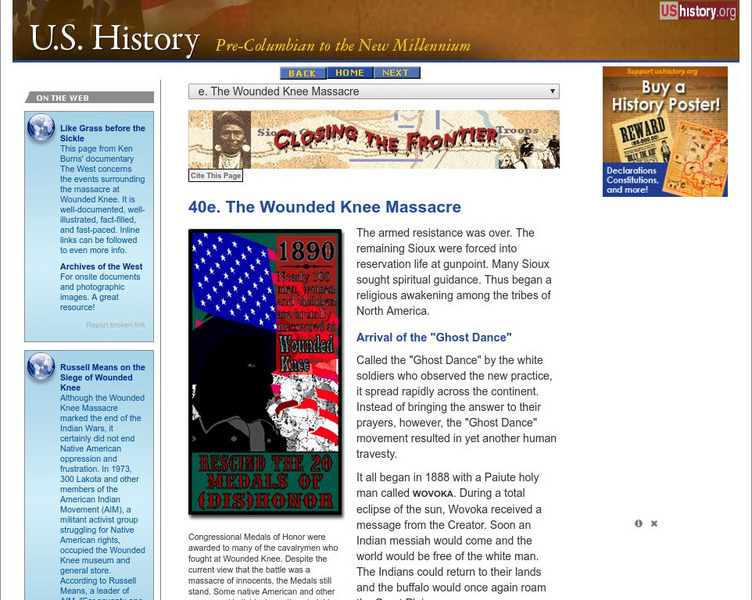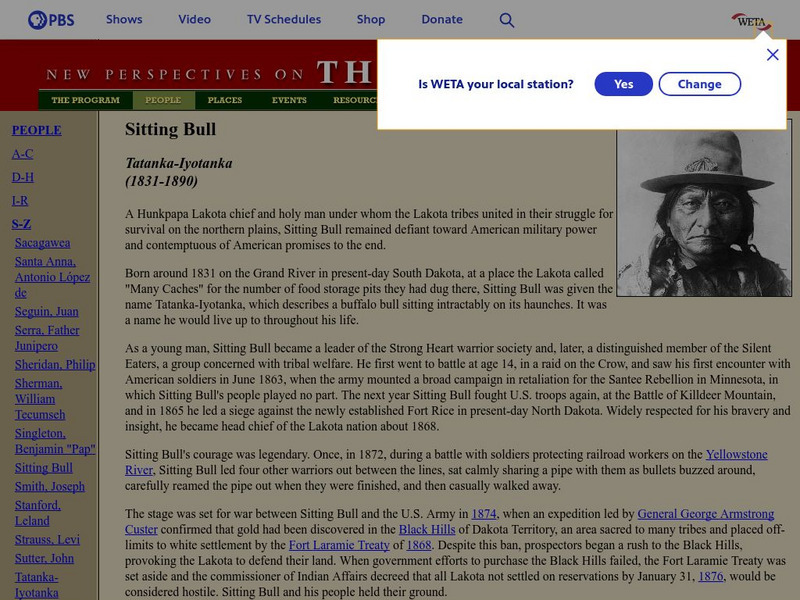Curated OER
The Ritual Fire Dance
This worksheet about "The Ritual Fire Dance" by Manuel de Falla, provides information on the musician, his music, and the dance. It includes 9 questions about the reading in addition to 5 questions about the instruments important in the...
Curated OER
Dark Name-Play in Neil Gaiman's The Graveyard Book
Explore the symbolism of characters' names in The Graveyard Book by Neil Gaiman. This fantasy children's novel lends itself to symbolism and many parallels with other works of literature and time periods. Names of the ghosts and...
Annenberg Foundation
Native Voices
The Navajo people build their dwellings with the doors facing the rising sun in the east to welcome wealth and fortune. Pupils learn about the traditions of the Navajo people in the first part of a 16-part unit. They explore American...
Curated OER
Verbally Speaking
Verbs are the center of attention in this resource. Students discover that a verb shows action, then they consider twenty sentences that each have an action verb. Students must click on one of three words at the bottom of each slide in...
Curated OER
The Sioux War
In this United States history worksheet, students utilize a word bank of 10 terms or phrases to answer 10 fill in the blank questions pertaining to the Native American experience. A short answer question is included as well.
Curated OER
Spirit Mask Ashira/Bapunu, Ogowe River, Gabon
Explore the concept of beauty as it has been seen through the eyes of various African tribal groups. Learners create masks of beauty as they see it, taking the African concept of inner beauty into consideration. This lesson is great for...
Curated OER
Ride 'Em Cowboy (Buffalo Bill Cody and the Wild West Show)
Students research the impact of Buffalo Bill Cody and his Wild West Show on the world's view of American western culture. They create a poster advertising the Wild West Show.
Curated OER
Spirit Mask
Students create traditional African art pieces. In this visual arts lesson plan, students use modeling materials to craft Gabon clay masks that represent beauty.
Annenberg Foundation
Annenberg Learner: American Passages: Native Voices: Ghost Dance Songs
A Native American Paiute man known as Wovoka, after seeing a vision, started the Ghost Dance religion which had many songs to carry on its oral tradition. Click on the tab "Ghost Dance Songs Activities" to explore activities and photos.
Khan Academy
Khan Academy: Us History: 1865 1898: The Ghost Dance and Wounded Knee
Explains the origin of the Ghost Dance movement and the massacre of the Sioux that happened at Wounded Knee. Includes questions for students.
Other
Idaho Mountain Express: Wovoka, Lame Deer, Rolling Thund
A great description of Wovoka's religion and the influence of the "Ghost Dance." It also describes how the "Ghost Dance" has evolved since his death.
The History Cat
The History Cat: War on the Great Plains: The Last Indian Wars
Learn how the 30-year Indian Wars started and about the battles that were fought over those years. Describes the emergence and growth of the Ghost Dance movement that was initially envisioned by a Paiute medicine man named Wovoka. White...
Independence Hall Association
U.s. History: The Wounded Knee Massacre
Read about the phenomenon of the Ghost Dance that was causing a religious reawakening with Native Americans in the 1880s. See how this caused the travesty at Wounded Knee Creek where the U.S. Army attacked peaceful Sioux who were trying...
Science Bob Pflugfelder
Science Bob: Make a Static Powered Dancing Ghost
Detailed instructions for making a static powered dancing ghost using common supplies.
PBS
Pbs: New Perspectives on the West
This in-depth resource presents a history of the American West from pre-Columbian times until World War I with profiles, documents, and images. It encourages visitors to link these into patterns of historical meaning for themselves....
Other
The Weekly South Dakotan: South Dakota History for 4th Grade
From the very beginning and through the twentieth century, this comprehensive collection of lessons will enrich students studying the history in between and the effects on South Dakota.
Other
Wounded Knee Museum
Virtual tour of the massacre at Wounded Knee from a museum dedicated to preserving the history of what happened there.
PBS
The West: Sitting Bull Tatanka Iyotanka
This is a biography of Lakota Indian Chief Sitting Bull who led his tribe in the Battle of the Little Bighorn against General George Custer.
Khan Academy
Khan Academy: Ap Us History: Period 6: 1865 1898
This Khan Academy resource provides a table of contents with notes for several sections of AP US History: Period 6: 1865-1898.
Digital Public Library of America
Dpla: The Wounded Knee Massacre
This primary source set uses documents, photographs, government records, and news reporting to explore the 1890 massacre at Wounded Knee and its historical impact.
A&E Television
History.com: 10 Things You May Not Know About Sitting Bull
Get the facts about one of the most legendary Native Americans of the 19th century. Sitting Bull was born around 1831 into the Hunkpapa people, a Lakota Sioux tribe that roamed the Great Plains in what is now the Dakotas.
Ibis Communications
Eye Witness to History: Massacre at Wounded Knee, 1890
This article provides information about the Massacre at Wounded Knee. Gives background information on why and how the battle happened and includes a first-hand account of what occurred at the battle from an interpreter for the Army who...
PBS
Pbs the West: Big Foot (?? 1890)
This article focuses on the massacre of Chief Big Foot and his followers at the Massacre of Wounded Knee.
Country Studies US
Country Studies: The Plight of the Indians
This site explains how as westward expansion grew, more and more Indians encountered settlers, ranchers and miners who sought life, land, and riches out West. Conflicts between settlers and Indians soon involved the federal government...









